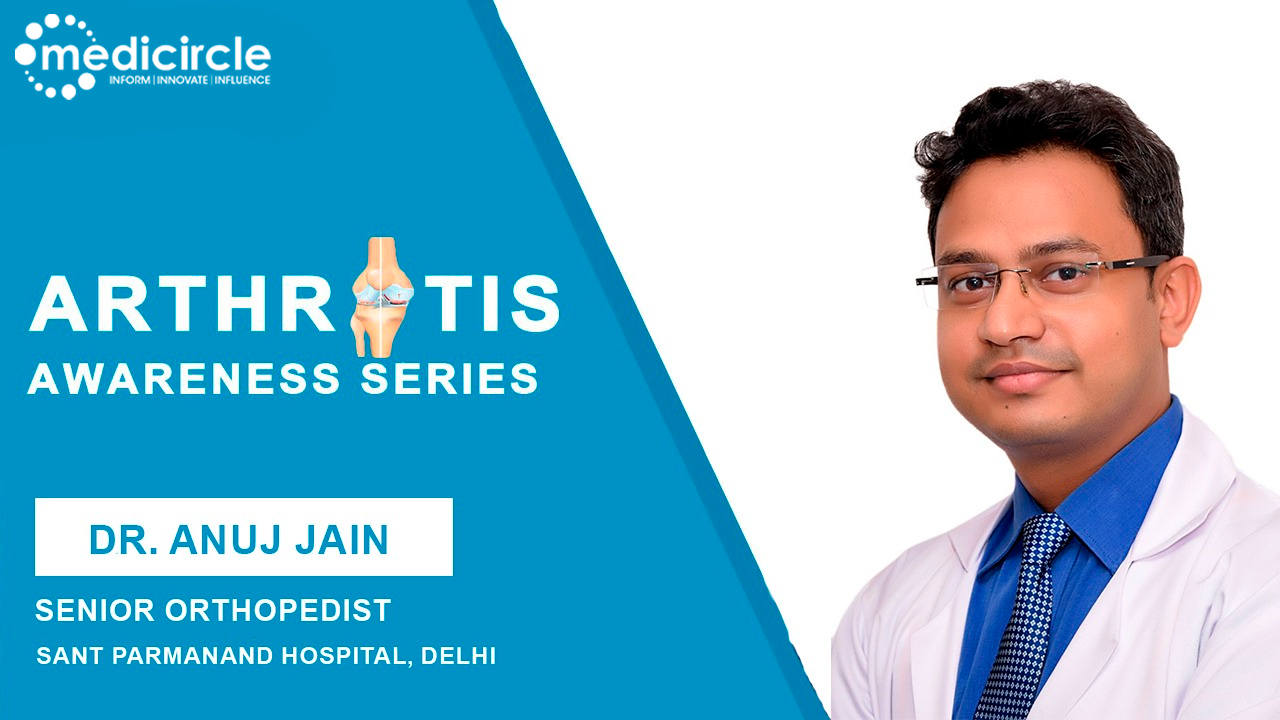Dr. Anuj Jain is a well-known Orthopaedic surgeon in Delhi NCR who has more than 10 years of experience in this field. He was the recipient of a national gold medal in orthopaedics in 2012 and is an orthopaedic ambassador to Singapore from India. He has done more than 2000 knee replacements and more than 300 hip replacements in the last 10 years. He works as a Senior joint replacement consultant in Sant Parmanand hospital, which was the recipient of the best orthopaedic hospital award in 2018.
When to consult a doctor for Arthritis?
Dr. Jain begins, “Most of the patients that come to us in Arthritis come at a very late stage. My advice is to come and seek a doctor when you see certain signs. The foremost sign is pain. This is the most common symptom of arthritis. If you feel pain for a prolonged period of time (5 to 7 days) and no home remedy is working, then you must consult the doctor.”
“Another sign is swelling. If the joints show inflammation, then consult the doctor immediately. The third sign is the intensity of pain. If the pain doesn’t subside even after taking painkillers, then consult your doctor. The next sign is the noise that you get from your joints while you are walking. Another thing is when you feel the shape of the bone is changing or deforming with time. These are the telling signs of arthritis.”
Swelling in Arthritis
Dr. Jain explains, “There are 2 types of arthritis. We always label it as arthritis but one never knows what type he or she is suffering from. The first type is related to age. This is called degenerative osteoarthritis. The second type is caused by genetics and is called rheumatoid arthritis. There are other types as well but these 2 are the main ones.”
“The swelling or inflammation is usually seen in genetics-related arthritis. Age-related arthritis has swelling but only occasionally. The fluid that gets stored in it gets drained automatically or is drained via syringes. In rheumatoid arthritis, multiple joints are involved like the hands, knees, etc. In these parts, swelling is seen in the morning and by the time evening comes it gets less. The next morning the levels go up again. Swelling is primarily seen in rheumatoid arthritis, psoriatic arthritis and ankylosing spondylitis.”
Arthritis Pain in the Night
Dr Jain elaborates, “In the classical description of inflammatory arthritis or rheumatoid arthritis, the patient will feel the most pain early in the morning. The moment they wake up they will feel their body clenched and it would take them an hour and a half to relax their body. After a while, the stiffness will fade. On the other hand, age-related arthritis shows the most symptoms in the evening. This is because by the time evening comes, they would have used their joints which causes them pain. When one feels pain in degenerative arthritis, it is a sign that they will need surgery.”
Does arthritis medicine affect kidneys?
Dr. Jain tells, “Many patients have this misconception not only in arthritis but also when they have fractures. They believe that taking painkillers will affect their kidneys. Painkillers are safe medicines. We always check which patients to administer these painkillers and whom to not give these medicines.”
“In arthritis, there are different types of medicines. The first type is steroids. This helps lessen the swelling and inflammation. The next type of medicine is painkillers. And the third type is the one that treats arthritis. Within these 3 categories of medicine, steroids are very safe for the kidneys.”
“There are 2 types of painkillers. First is nonsteroidal anti-inflammatory drugs and then there are Ultracet and paracetamol which do not lessen our inflammation. Over-the-counter drugs like combiflam and ketorolac if taken for a prolonged period of time will affect the kidneys. Especially for patients who have a sensitive kidney, have only one kidney, or have diabetes.”
“Such patients need to administer care and go for a safer combination of paracetamol along with crocin and tramadol. Other people who don’t suffer from kidney problems can take painkillers and be assured that their kidneys won’t be affected.”
Edited By: Priyal Shah
Contributed By: Dr. Anuj Jain, Senior Orthopedist, Sant Parmanand Hospital

 Know more about arthritis and the type of medicine to use. These medicines will not only help deal with the pain and swelling but would also be safe for your kidneys.
Know more about arthritis and the type of medicine to use. These medicines will not only help deal with the pain and swelling but would also be safe for your kidneys. 









.jpeg)

















.jpg)


